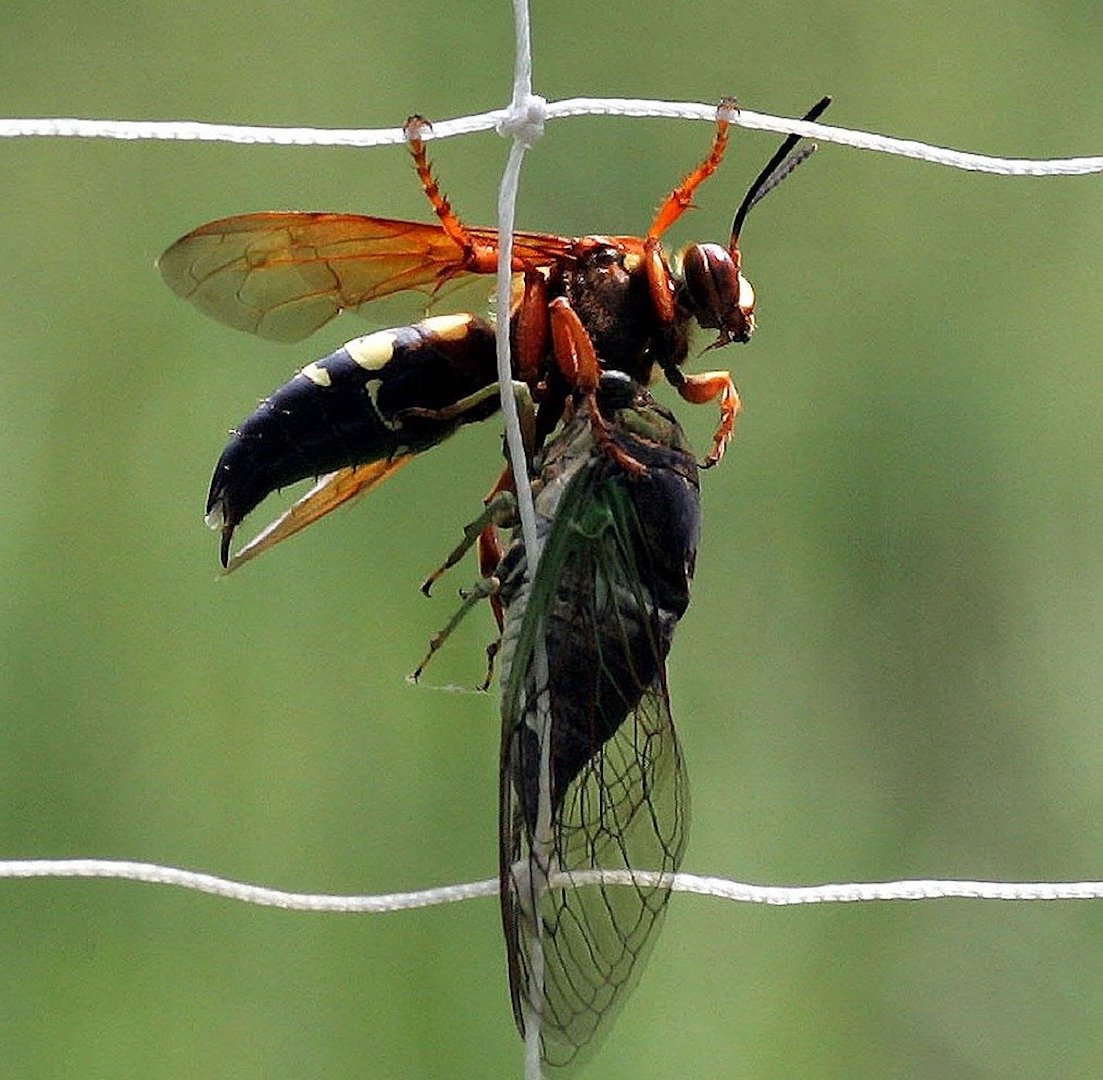Stinging insects are an incredibly popular pest found throughout Eastern Pennsylvania in the summer, especially in low-lying valleys like the Lehigh, Mahoning, and Wyoming Valleys.
While most stinging insects are considered more of a nuisance than outright dangerous, a new species of wasps invading Pennsylvania has put many homeowners on high alert.
While not lethal, cicada killer wasps are a large new insect found throughout Pennsylvania with a powerful sting.
If you’re not careful, these insects can make their way into your backyard, putting a damper on any summer plans you may have in store. Here’s everything you need to know about cicada killer wasps in Pennsylvania.
What is a Cicada Killer Wasp?
The name sounds quite threatening, but these flying insects are not as aggressive as their European counterparts. Unlike other wasps and bees, the Cicada Killer Wasp is a solitary insect that doesn’t live in colonies.
It’s also not a cicada, but they do kill them–hence the name. Cicada killer wasps will prey on cicadas, and the females will lay their eggs in their “prize.” Once the eggs hatch, the babies will feed on the carcass.
Typically, these wasps are mistaken for European wasps, but they look and “sound” more frightening than they are. In fact, they aren’t overly aggressive unless they are protecting their homes. Cicada killer wasps tend to stay away from people and remain in their burrows at night.
What do Cicada Killer Wasps Look Like?
Again, while these wasps may look like European hornets, there are a few distinct differences. Cicada killer wasps have red or orange legs and wings, and their bodies are typically in shades of brown.
They have thick wings and black/yellow markings. They can also be pretty big. The females measure about 2-inches long, while the male of the species measures two-times smaller.
Why Is the Cicada Killer Wasp a Problem?
While these insects aren’t really a danger or a health hazard, they can still cause problems. They aren’t poisonous and they won’t damage your house, but they do build underground nests. They don’t just build one either; they can make a series of underground burrows, which can be quite a problem for your yard and home.
Cicada killer wasps tend to build their nests in soft, dry ground or dirt. You can often spot them under playground equipment, near concrete, or in other dry areas.
While they aren’t aggressive, they will become agitated should you disturb their home. They can be very territorial, and if you have a few dozen nests in your backyard, it can be difficult to live with them.
Are Cicada Killer Wasps in Pennsylvania?
While a newer species in the state, cicada killer wasps are commonly found throughout Pennsylvania, particularly during the warm summer months. Their activity peaks in July and August, when cicadas are plentiful.
Homeowners frequently encounter them in sunny, well-drained areas like lawns, garden beds, along sidewalks, and in patches of bare or sandy soil.
How to Spot a Cicada Killer Wasp Nest
Cicada killer wasps create individual burrows in dry, loose, or sandy soil. These nests often appear as U-shaped tunnels about 1/2 inch in diameter, typically accompanied by small mounds of displaced dirt at the entrance. You may notice the wasps flying low to the ground or hovering near these openings, which is a strong sign of a nest nearby.
How do you Get Rid of Cicada Killer Wasps?
Like any pest problem, a little bit of prevention and know-how can do wonders. If you have a handful of cicada killer wasps, it may be a problem you can handle on your own.
However, if you have an overwhelming infestation, you can always contact a pest control expert to inspect and take care of the issue. In the meantime, here are a few things you can do to put a stop to cicada killer wasps.
1. Use Insecticidal Dust
If you’ve spotted cicada killer wasps burrowing into your backyard, you can try treating the area using insecticidal dust or pesticide. Keep in mind, you may end up killing other insects and creatures; be incredibly careful what you buy.
In addition, be cautious of using any pest killer on your own if you have small children or pets. Take the proper precautions when applying.
It should also be noted that not all sprays are effective against these wasps.
2. Control the Environment
If you want to avoid using pesticides, an easy way to keep these wasps away is by controlling the environment. If the cicada killer wasps don’t have the proper living conditions, they will look for a home elsewhere.
To burrow, they need dirt, sunlight, proper drainage, and a food source. The best way to keep them away is by making your yard uninhabitable for them.
Cut grass regularly, care for your gardens, and keep an eye on areas where they gravitate, like sandy areas or by concrete. Also, keep things hydrated.
3. Care for your Garden Regularly
A hot spot for cicada killer wasps is the garden. Whether you have a vegetable garden or a flower bed, you can keep these pests away by caring for your garden regularly. Turn the soil, water often, and monitor your plants on a day-to-day basis.
4. Water it All
A common theme in most of these tips is water. Cicada killer wasps prefer to live in dry areas.
Keeping things well-watered will keep these pests away. While we don’t recommend overwatering, maintaining your garden and yard with proper hydration will encourage these wasps to look elsewhere for a home. Water can also help with sandboxes, playground equipment, and other areas that aren’t hydrated.
5. Contact a Specialist
When it comes to stinging pests, you can never be too careful. While the methods above may help deter wasps and keep them from coming back, it may not be enough if you already have an infestation.
Additionally, these wasps can be resistant to many pesticides. If tending to your lawn and regular water treatments aren’t working, it’s a good idea to consult an expert.
While a cicada killer wasp plays an essential part in the ecosystem, having them in your backyard is no picnic. Though they could be frightening, they don’t have to be a problem.
Perform routine maintenance on your yard or property, and water regularly. You should be able to keep these wasps away from your home. However, should you find yourself swamped, don’t hesitate to contact a professional.
FAQs
Are cicada killer wasps dangerous to humans or pets?
Cicada killer wasps may look intimidating, but they’re generally not dangerous to humans or pets. Males do not have stingers, and females rarely sting unless directly handled or provoked. Their sting is mild compared to other wasps and bees, and they’re not aggressive by nature.
Do cicada killer wasps sting?
Yes, but only the females can sting. They typically only do so if threatened or mishandled. Males cannot sting at all, although they may act territorial by buzzing around intruders. Overall, cicada killer wasps are unlikely to sting unless disturbed.
How long do cicada killer wasps stay active?
Cicada killer wasps are seasonal and are most active during mid to late summer, typically from July through September. The adult wasps die off after mating and laying eggs, and the larvae overwinter in the soil before emerging the following year.




























